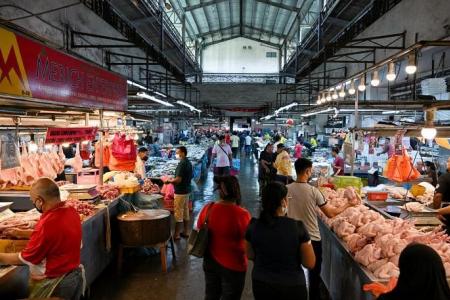Singaporeans allegedly smuggling fresh chicken from Johor
Singaporeans are said to be smuggling in fresh chicken from Malaysia.
Chicken sellers and supermarket staff in Johor told The Straits Times that "quite a few" Singaporeans have been buying chicken from them each week.
It is illegal to bring fresh chicken from Malaysia into Singapore without a permit, even if it is only for personal consumption.
Malaysia banned the export of chickens in June due to a shortage in domestic supply, resulting in almost no fresh chickens being available here.
However, chicken sellers in Johor who spoke to ST said there are Singaporeans who regularly buy whole chickens with the explicit intention of smuggling them across the border.
At a wet market in Larkin, a chicken seller in her 70s described how middle-aged women from Singapore would cross the border weekly to buy her fresh chicken.
"Quite a few Singaporeans come with their grocery carts and buy one or two whole chickens each time," she said.
"One of my regulars wraps it in newspaper, covers it with a layer of vegetables and wraps it again with more newspaper."
The seller said that her Singaporean customers had complained about the lack of fresh chicken back home, and were willing to risk breaking the law so they could cook their favourite dishes.
A 1.2kg fresh whole chicken in Johor retails for about RM15 (S$4.60) each, while a similar frozen whole chicken in Singapore is sold for about $6.
At a wet market in Kampung Pandan, a chicken seller in his 30s said some Singaporean regulars would also buy fresh chicken parts to take back home.
He said that while there was initially a shortage of chickens in Malaysia, there is currently more than enough to go around.
"We have enough chickens now, and when the Singaporeans buy, they buy only for personal consumption," he said.
At a supermarket in Aeon Mall Tebrau City, a staff member said fresh chicken was especially popular with Singaporeans.
The woman, in her 50s, said smuggling the chickens across the border did not seem to be an issue.
"Singaporeans like the ayam nenas (a type of chicken fed with pineapple enzymes) because it makes very tender steamed chicken," she said.
"It's actually very easy to hide. Just put it at the bottom of the grocery bags and place it near your feet in the car. No one checks the grocery bags."
Only licensed or registered traders may bring fresh chickens for commercial sale into Singapore.
Responding to queries from ST, the Singapore Food Agency (SFA) said travellers may bring in only a small quantity of food for personal consumption, and this applies to only certain types of food.
"Travellers returning from Malaysia are not allowed to bring live chicken and chicken meat products into Singapore," said an SFA spokesman.
"At the checkpoints, any prohibited, dutiable and/or controlled items must be proactively declared to Immigration and Checkpoints Authority (ICA) officers at the Red Channel. If ICA detects travellers bringing in prohibited food items, the travellers will be asked to dispose of these items."
She added that SFA reviews the personal allowance policy regularly based on the food safety risks.
According to the rules listed on the SFA's website, travellers from Malaysia are also not allowed to bring in any form of beef, mutton, pork or poultry meat, even if it is cooked.
However, they may bring in up to 5kg of fish products, out of which a maximum of only 2kg of frozen cooked crab meat and frozen cooked prawn meat is allowed.
Eggs and oysters are not allowed to be brought in from Malaysia, but a "small, reasonable quantity" of fruit and vegetables for personal consumption is allowed.
The rules are in place to manage health and safety risks, and SFA advises travellers to be aware of the risks associated with consuming such food items.
Under the Wholesome Meat and Fish Act, anyone who imports a meat or fish product without a licence may be jailed for up to two years and fined up to $50,000.
But the Act also allows for the offence to be compounded for a fine of up to $1,000.

Get The New Paper on your phone with the free TNP app. Download from the Apple App Store or Google Play Store now


